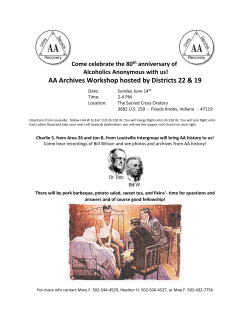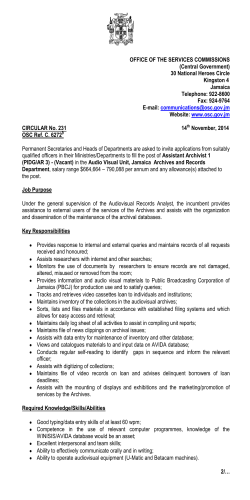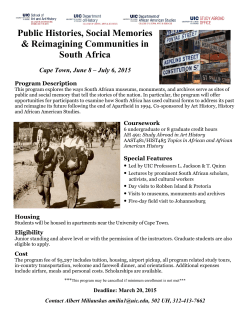
Monday, 27.04.2015 - The ICARUS document repository
BENEDIKTINSKÉ ARCIOPATSTVÍ SV. VOJTĚCHA & SV. MARKÉTY Archival Cooperation and Community Building in the Digital Age International conference Date: 27 – 29 April 2015 Venue: Břevnov Archabbey, Teresian Hall ̶ Markétská 28/1, 169 01 Praha 6, Czech Republic Programme Teresian Hall 13.00 Registration Monday, 27.04.2015 Conference opening 13.30 Eva Drašarová (Director of the National Archives) P. Alexius Vandrovec (Sub prior of Benedictines Archabbey in Břevnov) Thomas Aigner (President ICARUS) Eva Žáková (Head of Arts Institute and Czech Office of CULTURE Programme EU) Keynote Frédéric Kaplan (École politechnique fédérale de Lausanne) The Venice Time Machine Project 14.45 Coffee break Teresian Hall 15.15 17.00 18.00 20.00 Room 3 The Czech Archival Hackathon Landscape Soccer (Kepler High School) Joint dinner (Strahov brewery) With the support of the Culture Programme 2007-2013 of the European Union BENEDIKTINSKÉ ARCIOPATSTVÍ SV. VOJTĚCHA & SV. MARKÉTY Teresian Hall 08.30 Tuesday, 28.04.2015 10.15 10.45 12.30 13.30 15.15 15.45 17.15 17.30 18.30 Room 3 Genealogical resources: the rooting and branching Hackathon Coffee break Public Private Partnership: beneficial all around? Hackathon Lunch (monastery brewery) Geospatial Genealogy, Cadastral Maps & Digital Hackathon Archives Coffee break Let the crowd work! Hackathon Guided tour of Břevnov Archabbey Organ concert and reception (monastery cellar) Wednesday, 29.04.2015 Teresian Hall 08.30 Learning the past to build the future: education in the Digital Age 10.30 Coffee break 11.00 Building from scratch: written heritage online 13.00 Conference closing 13.30 14.30 Lunch 15.00 17.30 Guided tour Strahov Library Guided tour 1st department NA With the support of the Culture Programme 2007-2013 of the European Union BENEDIKTINSKÉ ARCIOPATSTVÍ SV. VOJTĚCHA & SV. MARKÉTY Keynote: The Venice Time Machine Project Archival cooperation and community building in the Digital Age Date and time: Monday, 27.04.2015 from 14.00 – 14.45 p.m. in the Teresian Hall Venue: Břevnov Archabbey - Markétská 28/1, 169 01 Praha 6, Czech Republic Abstract: The Venice Time Machine Project The Venice Time Machine is an international scientific programme launched by the EPFL and the University Ca’Foscari of Venice with the generous support of the Fondation Lombard Odier. It aims at building a multidimensional model of Venice and its evolution covering a period of more than 1000 years. Thanks to a parternship with the Archivio di Stato in Venice, kilometers of archives will be digitized, transcribed and indexed setting the base of the largest database ever created on Venetian documents. The information extracted from these sources will be organized in a semantic graph of linked data and unfolded in space and time in an historical geographical information system, both a “Facebook” and a “Google map” of the past. Frédéric Kaplan École politechnique fédérale de Lausanne, CH) Prof Frederic Kaplan holds the Digital Humanities Chair at Ecole Polytechnique Federale de Lausanne (EPFL) and directs the EPFL Digital Humanities Laboratory (DHLAB). He conducts research projects combining archive digitisation, information modelling and museographic design. He is currently directing the "Venice Time Machine", an international project in collaboration with the Ca'Foscari University in Venice and the Venice State Archives, aiming to model the evolution and history of Venice over a 1000 year period. He is also conducting projects with the Bibliothèque Nationale de France, the Bibliothèque Nationale Suisse, the Bodmer Foundation, the Musée de l'Elysée and participated to exhibitions in several museums including the Centre Pompidou in Paris and the Museum of Modern Art in New York. With the support of the Culture Programme 2007-2013 of the European Union BENEDIKTINSKÉ ARCIOPATSTVÍ SV. VOJTĚCHA & SV. MARKÉTY Frederic Kaplan graduated as an engineer of the Ecole Nationale Supérieure des Telecommunications in Paris and received a PhD degree in Artificial Intelligence from the University Paris VI. Before founding the Digital Humanities Laboratory, he worked ten years as a researcher at the Sony Computer Science Laboratory and six years at the EPFL pedagogical research laboratory. He was also the founder and president of OZWE, a company that designed and produced innovative interfaces, now of one the world leading studio in immersive gaming. Frederic Kaplan published more than a hundred scientific papers, 6 books and about 10 patents. He is the chief editor of Frontiers in Digital Humanities and co-directs the Digital Humanities book collection at EPFL Press. He created the first Digital Humanities Master course in Switzerland and is now taking an active role for shaping a complete new curriculum at EPFL. He was the co-local organizer of the Digital Humanities 2014 conference in Lausanne, the largest scientific meeting ever conducted in this domain. With the support of the Culture Programme 2007-2013 of the European Union BENEDIKTINSKÉ ARCIOPATSTVÍ SV. VOJTĚCHA & SV. MARKÉTY The Czech Archival Landscape Archival Cooperation and Community Building in the Digital Age Date and time: Monday, 27.04.2015 from 15.15 – 17.00 o’clock in the Teresian Hall Venue: Břevnov Archabbey - Markétská 28/1, 169 01 Praha 6, Czech Republic Programme The panel and the following discussion round will be moderated by PAVLA JIRKOVÁ (CZECH NATIONAL ARCHIVES IN PRAGUE) EVA DRAŠAROVÁ (CZECH NATIONAL ARCHIVES IN PRAGUE) National Digital Archives EVA GREGOROVIČOVÁ (CZECH NATIONAL ARCHIVES IN PRAGUE) Digitalization of the documents and manuscripts of the Tuscan Habsburg family archive within the Monasterium project LENKA MATUŠÍKOVÁ (CZECH NATIONAL ARCHIVES IN PRAGUE) Archival Sources on the History of the Jews in the Czech Lands digitized in the National Archives in Prague KATEŘINA ZENKLOVÁ (CZECH NATIONAL ARCHIVES IN PRAGUE) Digitizing of the municipal books in the frame of the project Libri Civitatis LADĚNA PLUCAROVÁ (DIGITAL ARCHIVES, STATE REGIONAL ARCHIVES TŘEBOŇ) Digital Archives of the State Regional Archives in Třeboň - building, function and international perspectives TOMÁŠ ČERNUŠÁK (MORAVIAN STATE ARCHIVES IN BRNO) New digitizing projects in the Moravian Provincial Archives in Brno KAREL HALLA AND MILAN AUGUSTIN (STATE DISTRICT ARCHIVES CHEB, STATE DISTRICT ARCHIVES KARLOVY VARY) Porta Fontium and Czech-Bavarian Archive Guide. The Common Projects of the Czech and Bavarian State Archives and Further Perspectives of Digitizing With the support of the Culture Programme 2007-2013 of the European Union BENEDIKTINSKÉ ARCIOPATSTVÍ SV. VOJTĚCHA & SV. MARKÉTY Genealogical resources: the rooting and branching Archival Cooperation and Community Building in the Digital Age Date and time: Tuesday, 28.04.2015 from 08.30 – 10.15 o’clock in the Teresian Hall Venue: Břevnov Archabbey - Markétská 28/1, 169 01 Praha 6, Czech Republic Programme Church registers are the most valuable sources for genealogic research. They keep information about liturgical actions such as christenings, weddings and funerals. Church registers are witnesses to liturgical life as well as state-run administration. For a long time they have been the only directory that documented the development of a parish’s population. Therefore, they constitute a unique source of information for the Early Modern Ages and the 19th century. The panel and the following discussion round will be moderated by HERBERT WURSTER (ARCHIVES OF THE DIOCESE OF PASSAU, DE) HERBERT WURSTER (ARCHIVES OF THE DIOCESE OF PASSAU) The process of making church registers accessible online in Europe GEORG GAUGUSCH (HERALDIC-GENEALOGIC ASSOCIATION “ADLER”, VIENNA) Equalization and Democracy – Historical Research in Central Europe in the 21st Century PEER BOSELIE (DIRECTOR OF THE EUREGIONAL HISTORIC CENTRE AND CITY ARCHIVIST OF SITTARD-GELEEN, NL) The Aezel Project BORIS BLAŽINIĆ (HEAD OF INSTITUTE FOR HUMAN POTENTIAL DEVELOPMENT, CROATIA) How to sell the past? - People buy people first! GÜNTER JUNKERS (VEREIN FÜR COMPUTERGENEALOGIE) Innovative technologies for making crowdsourcing most effective in online indexing and transcribing digitized genealogy related sources PAMELA WEISBERGER (PRESIDENT AND RESEARCH COORDINATOR, GESHER GALICIA INC.) . The All Galicia Database: digitizing and indexing religious community records to enable easy public access and productive research With the support of the Culture Programme 2007-2013 of the European Union BENEDIKTINSKÉ ARCIOPATSTVÍ SV. VOJTĚCHA & SV. MARKÉTY Public Private Partnerships: beneficial all around? Archival Cooperation and Community Building in the Digital Age Date and time: Tuesday, 28.04.2015 from 10.45 – 12.30 o’clock in the Teresian Hall Venue: Břevnov Archabbey – Markétská 28/1, 169 01 Praha 6, Czech Republic Programme The term Public Private Partnership gains increasingly in importance in the world of archives and libraries – especially against the backdrop of said institutions being able to effectively manage the challenges entailed with the progress of digitization. This session will examine specific experiences and the benefit for the individual actors. Simultaneously, paths for improving the access to and indexing of archival material with the support of Public Private Partnerships to the benefit of all users will be explored. The panel and the following discussion round will be moderated by FRANCESCO ROBERG (HESSIAN STATE ARCHIVES IN MARBURG, DE) SOFIE QUIDENUS (QUIDENUS TECHNOLOGIES, VIENNA) Public and Private: no contradiction! T. CSABA REISZ (HUNGARIAN NATIONAL ARCHIVES, BUDAPEST) Let the shoemaker stick to his last? VLATKA LEMIĆ (CROATIAN STATE ARCHIVES, ZAGREB) One decade of international cooperation and public-private enterprises in Croatian archives – between reality and opportunity CAROLINE KIMBELL (NATIONAL ARCHIVES UK) Commercial Partnerships at the UK National Archives: protecting staff and services from cuts MAX KAISER (AUSTRIAN NATIONAL LIBRARY, VIENNA) ‘Austrian Books Online‘. A Public Private Partnership between the Austrian National Library and Google With the support of the Culture Programme 2007-2013 of the European Union BENEDIKTINSKÉ ARCIOPATSTVÍ SV. VOJTĚCHA & SV. MARKÉTY Geospatial Genealogy, Cadastral Maps and Digital Archives: Partnerships and Collaborations Archival Cooperation and Community Building in the Digital Age Date and time: Tuesday, 28.04.2015 from 13.30 – 15.15 o’clock in the Teresian Hall Venue: Břevnov Archabbey – Markétská 28/1, 169 01 Praha 6, Czech Republic Programme Map-centric websites with historical European administrative, military, and cadastral maps are flourishing online. What are their practical applications for historians, genealogists and academics? Learn about the current state of archival map digitization, the progress in geo-referencing and dataand time-layering of maps, along with the ongoing development challenges facing individual researchers and special interest groups. A key goal of enhanced historical mapping is recreating and reimagining vanished communities, which can be achieved by correlating data and multimedia from formal and informal archival sources to geographical locations and placing people and events in their temporal and spatial context, encouraging further research from multiple perspectives. An important side benefit is reunifying common heritages (and archival collections), which have become scattered due to mass emigration, border changes, resettlement, and genocide. The panel and the following discussion round will be moderated by ANDRÁS SIPOS (BUDAPEST CITY ARCHIVES, HU). ELŐD BISZAK: (ARCANUM LTD., BUDAPEST, HU) Update on MAPIRE: historical maps of the Habsburg Empire PAMELA WEISBERGER (PRESIDENT AND RESEARCH COORDINATOR, GESHER GALICIA INC., USA). Using unique and unusual archival records and data to illustrate and annotate historical maps, bringing vanished communities to life JAY OSBORN (DIGITAL CARTOGRAPHY COORDINATOR, GESHER GALICIA, USA) Community leveraging of archive map data: cooperative opportunities to build on the wealth of digitized historical maps in national and regional archives PEER BOSELIE (DIRECTOR OF THE EUREGIONAL HISTORIC CENTRE AND CITY ARCHIVIST OF SITTARD-GELEEN, NL) The Aezel Project: historical mass-data integrated within a cadastral context With the support of the Culture Programme 2007-2013 of the European Union BENEDIKTINSKÉ ARCIOPATSTVÍ SV. VOJTĚCHA & SV. MARKÉTY Let the crowd work! Archival Cooperation and Community Building in the Digital Age Date and time: Tuesday, 28.04.2015 from 15.45 – 17.15 o’clock in the Teresian Hall Venue: Břevnov Archabbey - Markétská 28/1, 169 01 Praha 6, Czech Republic Programme Crowdsourcing content and ideas in order to enhance and expand knowledge democratically is becoming more and more important by the day in today’s society. It has proven to be an invaluable resource also in the archival world. This session will exemplify these experiences of crowd sourcing and its effects on in the archival landscape. The panel and the following discussion round will be moderated by ALEXANDER SCHATEK (FOUNDER TOPOTHEQUE, AT) SARAH LUND PETERSEN AND AUGUST ERIKSEN (DANISH NATIONAL ARCHIVES, COPENHAGEN) 20 years with crowdsourcing in Denmark – status, experience and new projects GUNILLA NORDSTRÖM AND MARIA LARSSON ÖSTERGREN (SWEDISH NATIONAL ARCHIVES, STOCKHOLM) Crowdsourcing in archives in Sweden – an introduction: Opportunities, advantages, limits and criticism KATHRIN SAMMER (TOPOTHEK NEUFELDEN IN AUSTRIA) The Knowledge of the Crowd, Is Everybody an Expert? MILENA DOBREVA (UNIVERSITY OF MALTA) From Crowdsourcing to Citizen Science: Re-thinking Engagement with Citizens in Archives ALEXANDER SCHATEK (FOUNDER TOPOTHEQUE, AT) How to make the crowd work – a field report on setting up local online archives With the support of the Culture Programme 2007-2013 of the European Union BENEDIKTINSKÉ ARCIOPATSTVÍ SV. VOJTĚCHA & SV. MARKÉTY Learning the past to build the future: education in the Digital Age Archival Cooperation and Community Building in the Digital Age Date and time: Wednesday, 29.04.2015 from 08.30 – 10.30 o’clock in the Teresian Hall Venue: Břevnov Archabbey - Markétská 28/1, 169 01 Praha 6, Czech Republic This panel is based on the educational activities that have been initiated within the ENArC (European Network on Archival Cooperation) project. These activities are manifold in their shaping: From academic courses applying MOM-CA1 and other digital technologies for blended learning opportunities for European university students, to multidisciplinary research activities with pedagogues and computer scientists; educational activities (for archivists, young graduates, trainees, researchers) connected to the creation of digital archives in Monasterium.Net; cooperation activities with the MOM-CA technical development section that continuously improves the software and its educational potentialities; institutional cooperation in the e-learning sector beyond ICARUS; numerous national and international dissemination and research actions resulting from the ENArC project’s congress activities and finally up to the creation of a prolific ICARUS didactics group, composed of university teachers and tutors from 15 European countries, which will continue their work beyond the life time of the ENArC project. 1 MOM-CA is the online portal of the Monasterium project. It is a way to work with medieval and early modern charters, one of the most important sources for European history and culture. It enables all interested persons to use the charters as well as jointly improve the data of these documents for all other users using EditMOM, its collaborative editing tool. With the support of the Culture Programme 2007-2013 of the European Union BENEDIKTINSKÉ ARCIOPATSTVÍ SV. VOJTĚCHA & SV. MARKÉTY Programme The panel and the following discussion round will be moderated by ANTONTELLA AMBROSIO (ICARUS DIDACTICS GROUP – UNIVERSITY OF NAPLES FEDERICO II, IT) ANTONELLA AMBROSIO AND VERA ISABELL SCHWARZ-RICCI (ICARUS DIDACTICS GROUP – UNIVERSITY OF NAPLES FEDERICO II, IT) The University teaching with MOM-CA and Monasterium.NET in the ENArC-project ADELHEID KRAH (INSTITUTE FOR AUSTRIAN HISTORY AT THE UNIVERSITY OF VIENNA, AT) Experiences with MOM-CA: The example of the academic courses. ´Methods of Historical Research and Writing MARIE RYANTOVA (UNIVERSITY OF SOUTH BOHEMIA IN ČESKÉ BUDĚJOVICE, CZ ) Use of the digital copies in university teaching: parsons´ reports of Prague Archdiocese from the year 1677 and their edition LUDMILA SULITKOVA (JAN EVANGELISTA PURKYNĚ UNIVERSITY IN ÚSTÍ NAD LABEM, CZ) Electronic textbook for studying of the archival sciences and diplomatics at the Faculty of Humanities of Ústí nad Labem (Czech Republic) MANUEL SALAMANCA (COMPLUTENSE UNIVERSITY OF MADRID, ES ) Dissemination of knowledge in the virtual environment: organization of activities of I+D+I LUCYNA HARC AND PRZEMYSLAW WISZEWSKI (INSTITUTE OF HISTORY AT THE UNIVERSITY OF WROCŁAW, PL) The digitization of archival materials in academic education of historians and archivists. The use of Web 2.0 tools With the support of the Culture Programme 2007-2013 of the European Union BENEDIKTINSKÉ ARCIOPATSTVÍ SV. VOJTĚCHA & SV. MARKÉTY Building from scratch: written heritage online Archival Cooperation and Community Building in the Digital Age Date and time: Wednesday, 29.04.2015 from 11.00 – 13.00 o’clock in the Teresian Hall Venue: Břevnov Archabbey - Markétská 28/1, 169 01 Praha 6, Czech Republic Programme This session is dedicated to officially wrap-up the EU funded ENArC-project (European Network on Archival Cooperation). Aside from partner presentations regarding their specific project results, an overall look back at the entire project and its’ outcomes as well as the paths it has opened up for the future will be outlined. Last but not least, this session should be used by the project partners to exchange the experiences they have made and the knowledge they have gained by having worked together as partners for 4 years. The panel and the following discussion round will be moderated by THOMAS AIGNER (ST. PÖLTEN DIOCESAN ARCHIVES, AT) GERHARD IMMLER (BAVARIAN STATE ARCHIVES, MUNICH) Early Modern Charters of Bavarian dioceses and monasteries as sources documenting international relations ŽARKO VUJOŠEVIĆ (INSITUTE FOR BALKAN STUDIES, SERBIAN ACADEMY OF SCIENCES AND ART, BELGRADE) Picking up the pieces: Written heritage of medieval South Eastern Europe going online Ma BELÉN De Alfonso Alonso-Muñoyerro (NATIONAL HISTORICAL ARCHIVES OF SPAIN, MADRID) The National Historical Archives of Spain and the Monasterium project" MARIA ROSARIA FALCONE, FRANCESCO LERRA (UNIVERSITÀ DEGLI STUDI DI NAPOLI FEDERICO II, IT) Digitization, Digital Archives and the Italian experience: new prospects for improved accessibility? ENIKŐ TÖRÖK (HUNGARIAN NATIONAL ARCHIVES, BUDAPEST) Exploration and dissemination of cadastral maps and records With the support of the Culture Programme 2007-2013 of the European Union BENEDIKTINSKÉ ARCIOPATSTVÍ SV. VOJTĚCHA & SV. MARKÉTY ANTON AVAR (HUNGARIAN NATIONAL ARCHIVES, BUDAPEST) Data base on grants of arms (litterae armales) ANDRÁS SIPOS (BUDAPEST CITY ARCHIVES; HU) Presentation of the e-proceedings of the ICARUS workshop “Cartography and Cadastral Maps: Visions from the past, for a vision of our future,” held in Pisa, October 2013 THOMAS AIGNER (ST. PÖLTEN DIOCESAN ARCHIVES, AT) The ENArC-project: retrospect and perspectives With the support of the Culture Programme 2007-2013 of the European Union
© Copyright 2025









